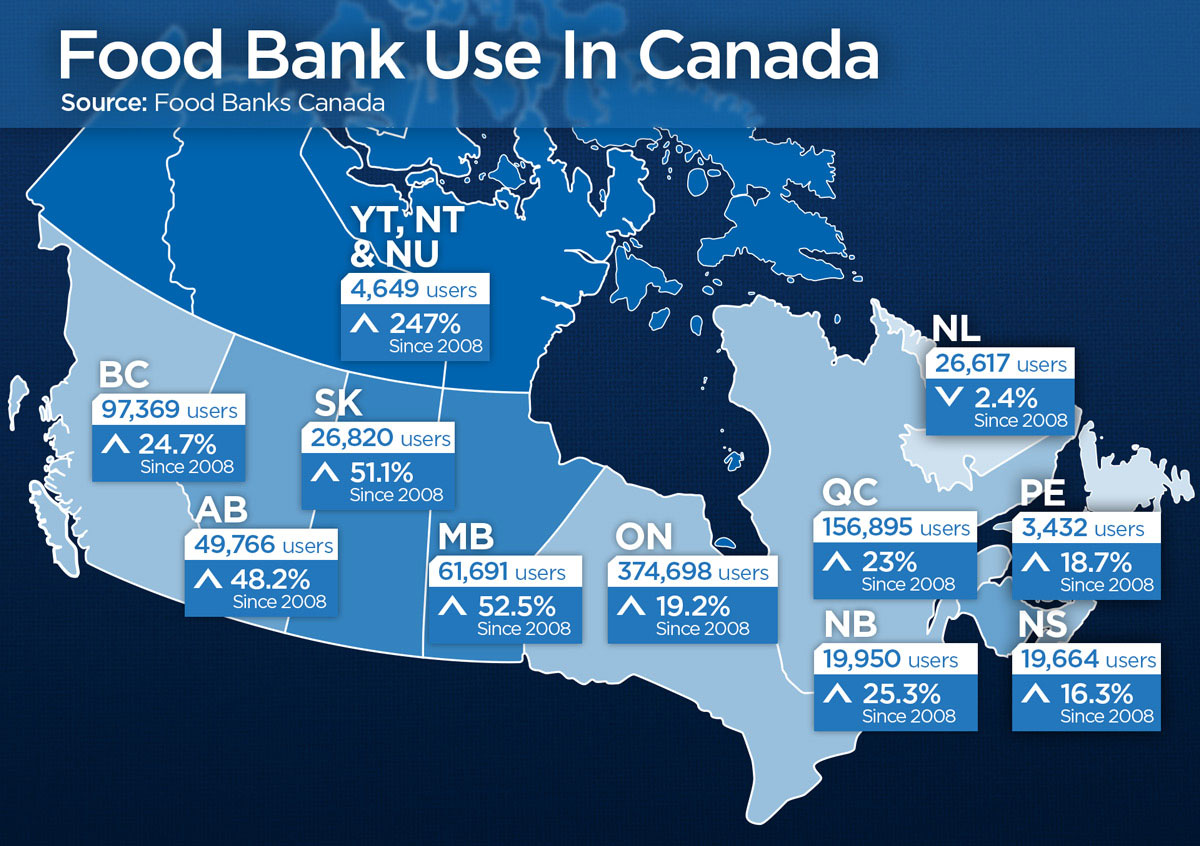TORONTO – A new report says the number of households in Ontario turning to food banks for the first time has shot up by 20 per cent since last year.

The report from the Ontario Association of Food Banks found just over 17,000 households used food banks for the first time this March, compared to 14,206 last year.
Last month, Food Banks Canada said in its annual report that one in every six households helped by food banks has income from current or recent employment.
READ MORE: First-time users of Ontario food banks spike by 20 per cent, says report
Although 841,191 Canadians turn to food banks every month just to make ends meet, many misconceptions still exist regarding individuals who access these services.
Here’s a look at common myths regarding food bank use in Canada.
Myth: Food banks create dependence among the people they help
The idea that receiving food from a food bank somehow makes a person less likely or less able, on their own, to make an effort to earn the money required to purchase the food they need without help is a common belief. Simply put, experts say many people think that food banks make people lazy.
Yet according to the Ontario Association of Food Banks, over the course of 2013, close to half of people assisted by a food bank walked in for the first time and an equivalent number stopped using a food bank.
“The theory seems to suggest that all it takes is three or four days’ worth of free food to make a person unable to care for themselves; that people lose the will to improve their lives because they got a bit of help or that people, on the whole, lack resilience,” said a Food Banks and the Dependence Myth 2014 report.
READ MORE: Use of food banks remains high in Canada, says report
According to Valerie Tarasuk, a professor at University of Toronto’s Department of Nutritional Sciences, many people may also avoid or stop using a food bank due to fear of stigma.
Myth: Many people who use food banks don’t really need them
In order to access services at most food banks, an interview process may occur to assess if the individuals fit the eligibility criteria.
- Roll Up To Win? Tim Hortons says $55K boat win email was ‘human error’
- Bird flu risk to humans an ‘enormous concern,’ WHO says. Here’s what to know
- Halifax homeless encampment hits double capacity, officials mull next step
- Ontario premier calls cost of gas ‘absolutely disgusting,’ raises price-gouging concerns
The Daily Bread in Toronto, for example, requires that a person brings some form of documentation that indicates their financial and home situation.
READ MORE: Harper unveils controversial tax relief for Canadian families
“We do this to see how much money they have left over after they have paid their rent to meet the rest of their needs — including their most basic needs, such as food,” says a statement on their website. “The interview is necessary so that food is getting to people who need it. It also ensures that the people who have the least income have the greatest access to food.”
Myth: Those who use food banks do not work
Food Banks Canada says that one in six people who use food banks are currently or recently working while half of the households accessing food banks report that welfare is their primary source of income.
The majority who receive food live in rental housing, 20 per cent live in social or subsidized housing, seven per cent own their home and four per cent are virtually homeless or temporarily with family or friends.
Myth: People who use food banks lack an education
According to the Daily Bread Food Bank’s Who’s Hungry 2013 report, one in four food bank clients have a university education or higher.
From this number, 17 per cent of food bank users have some college or university education, 16 per cent had a college diploma, while 13 per cent had a bachelor’s degree.
Myth: Food banks don’t provide any other services
According to the HungerCount report, almost 80 per cent of food banks in Canada say they offer at least one non-traditional service to those who access their services.
Thirty-nine per cent of food banks in Canada say they offer skill-building programs that includes education and training or help with budgeting and employment search while 37 per cent offer programs for expecting or new mothers.



Comments